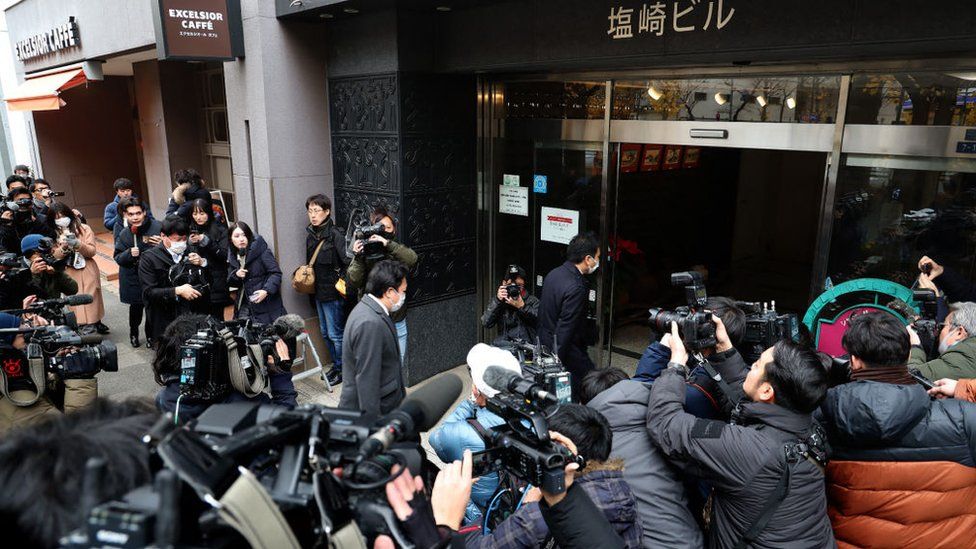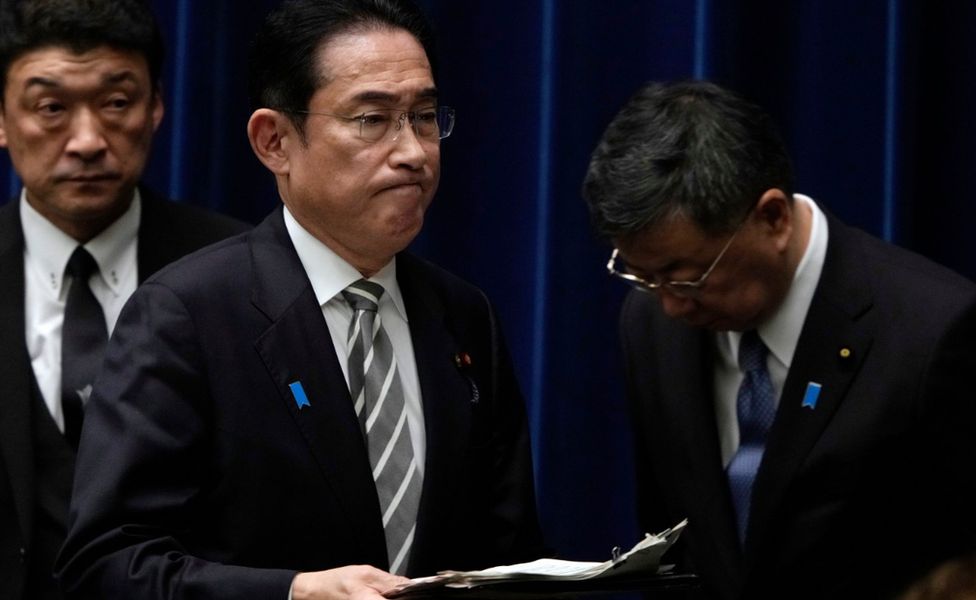Corruption scandal threatens PM Kishida’s government
Japan is going through a “once in a generation” political crisis, analysts say, as the government fights to clean up its image in the face of a corruption scandal.
Four cabinet ministers from the long-term ruling party have resigned in the past fortnight, as Prime Minister Fumio Kishida fights to hang on. His approval ratings are down to 17% – the worst in over a decade. And public anger and outrage has boiled over on social media.
Some hope this could be a tipping point for reforms in governance. But others note it’s the Liberal Democratic Party (LDP) in the spotlight – the party that has ruled Japan almost continuously since 1955.
Its time in power has long been marked by similar scandals- one reason why analysts say voters in the leading Asian democracy are feeling disillusioned and cynical.
In recent months, media reports have emerged accusing LDP politicians of pocketing excess funds received at fundraisers.
Most of the allegations have been levelled at the powerful Abe faction, named after the former prime minister Shinzo Abe who was assassinated last year. It’s the largest group in the ruling party with 99 lawmakers. Until recently, it also held some of the most critical positions in the cabinet.
Its members are alleged to have hidden at least 500m yen (£2.7m; $3.5m), although some media reports peg the amount closer to 1bn yen.
Prosecutors this week raided the offices of the Abe group and the Nakai faction, another leading LDP group. They’re said to be investigating five of the six LDP factions for under-reporting ticket funds – including the prime minister’s faction.

In Japan, it is common for politicians to host ticketed events where they are set a fundraising target through ticket sales. But many LDP MPs are accused of keeping excess sales off the books; they’re alleged to have pocketed the “kickbacks” or put it into a slush fund. The slush fund money is used to make payments to either maintain or increase their political network, a practice common across Japanese politics, says Seijiro Takeshita, a professor of management and informatics at the University of Shizuoka.
“In order to sustain your position as an MP in Japan, you often have to take good care of your buddies – the ones who will support you in your prefecture, or in the cities, towns or villages [and] the regional politicians,” he says. “And in order to, basically in my opinion, bribe them, you need cash, because you can’t go through the formal methodology of donations anymore – that’s forbidden.”
As public anger grew over the fundraising claims, four senior lawmakers eventually resigned from Mr Kishida’s cabinet, including Hirokazu Matsuno, the chief Cabinet secretary.
Seen as Mr Kishida’s right hand man, Mr Matsuno co-ordinated policy across government and was one of the best-known faces of the government. Days prior to his resignation, Mr Kishida had even defended him as the opposition tried to pass a motion of no confidence in the cabinet.
But as the pressure mounted, Mr Kishida was forced to replace him and other Abe faction ministers: Trade Minister Yasutoshi Nishimura, Internal Affairs Minister Junji Suzuki, Agriculture Minister Ichiro Miyashita and Deputy Defence Minister Hiroyuki Miyazawa.
While the PM isn’t part of the two big factions being probed, prosecutors on Tuesday said they were investigating his group too.
Mr Kishida himself hasn’t been implicated in wrongdoing, and he withdrew from his faction last week to distance himself.
He has also pledged to clean up politics and hinted at legal reforms, promising to take to the task “like a ball of fire”.

However analysts say the public’s lack of confidence in Mr Kishida is reflected in his continued slide in the polls.
Seen as a safe pair of hands by competing factions, Mr Kishida was voted as the party’s leader in October 2021, replacing a retiring Abe as PM.
But his tenure has been marked by a slew of scandals – from his party’s links to a controversial church and his son’s use of a PM residence for a house party.
There is also general voter resentment and malaise over the cost of living crisis as households deal with a decades-overdue surge in inflation.
Mr Kishida’s saving grace may be that a party leadership vote is not due until next September. Potential challengers like digital minister Taro Kono and Shigeru Ishiba are popular with the public but lack support in the LDP.
A general election also isn’t due until 2025. Furthermore, opposition parties are seen as too minor, fractured or just “incompetent” says Prof Takeshita. He says much of the population is still reeling from the Democratic Party of Japan’s time in power from 2009-2012 – a period which saw the Fukushima nuclear power station meltdown and was viewed by many as disastrous for Japan’s economy.
The party also struggled to work with the government bureaucracy, analysts say.
The lack of a viable alternative is one reason why voters, after every LDP corruption scandal, have grown apathetic.
“They can see the corruption and wrongdoing of the LDP, which really puts people’s minds in a very negative space. But you know, they think it doesn’t make much difference if they vote or not,” Prof Takeshita says. “That’s the reason why the voting turn-out levels and the interest towards politics among the Japanese public is down to the rock bottom.”
With that in mind, analysts like Prof Takeshita aren’t hopeful that this could spell the end of LDP dominance or majorly redefine Japanese politics.
Commentators have instead fixated on how it could play out in terms of politics in the LDP: the removal of key figures could change the government’s course on policies ranging from tax cuts to foreign affairs and even the PM’s flagship defence ramp-up.
There will most likely be a crackdown on regulations, and introduction of more stringent reporting measures around money flow, says Prof Takeshita.
But the shake-up won’t necessarily lead to profound reform, or a foundational breakdown of the LDP. “It’s not big enough of a scandal for Kishida to get consensus from the party to make an overhaul,” he says. “And there’s a lot of people who benefit from this methodology of funding in Japan, a lot of people who know that’s the status quo. And the one thing the Japanese public don’t want to do is break the status quo.”
(BBC)



